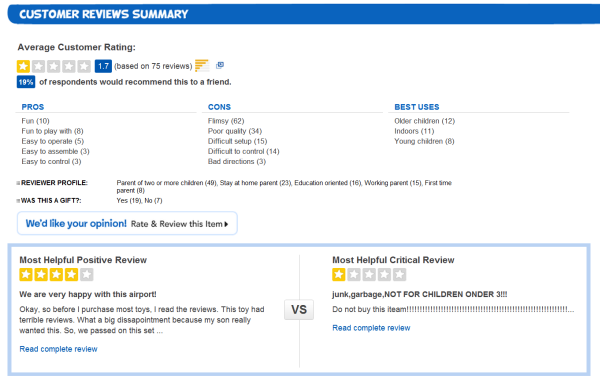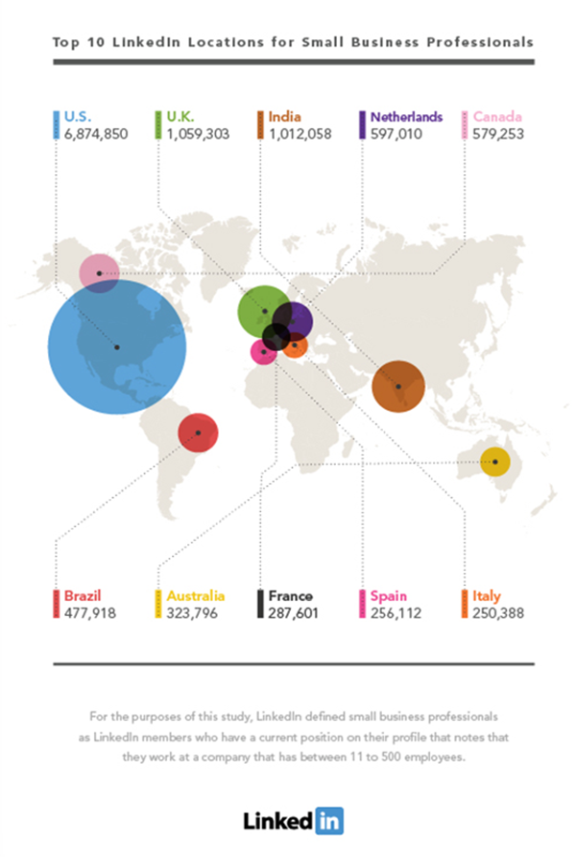This is a guest post by Rich Gorman.
A sterling reputation is worth its weight in gold — figuratively speaking, of course. That’s why businesses work for years, sometimes even decades, to earn the public’s trust, and to gain as much consumer goodwill as possible. In this Digital Age, however, all of that hard work can be undone in an instant.
It just takes one bad review. The source of the review is irrelevant. It may be from an actually unhappy customer, but it could just as easily come from the kind of customer who is simply impossible to please. The bad review could come from a disgruntled ex-employee, or it could even be planted by one of your business rivals. The source is irrelevant; what matters it that the bad review is out there, on the Internet, for the whole world to see.
The Damage Done
Unfortunately, the damage that a single bad review can do is significant — and it can come in many forms. Just as unfortunate is the fact that, in these instances, Google, Yahoo, and Bing are not necessarily on your side.
Here is a scenario — one that happens day in and day out. A consumer is searching for a particular kind of business — let’s say, just for the sake of an example, a hotel. The consumer conducts a Google search for “hotels in Asheville, NC” — and the first result that Google displays is for your Asheville-based hotel!
That’s good news, right? Well, not necessarily. Google heavily weighs reviews from consumer sites like Yelp or TripAdvisor — so if you don’t have a strong corporate website, backed with rock-solid SEO techniques, then the first result to be displayed could well be a consumer review. That review may be a positive one — but what if it’s not? What if the first piece of information a consumer sees about your hotel is a one-star review?
Obviously, it’s trouble for you, the hotel owner. The consumer’s not going to want to stay in a one-star hotel, so he or she will scroll down the page to find an alternative. And — again, this being Google — an alternative will not be hard to find. In fact, you can bet that Google will display a five-star review for your closest competitor. If there are two hotels on the same street corner, one with one-star reviews and the other with five-star reviews, well, which do you think is going to get the most business?
The Truth About Consumer Behavior
It’s not just that bad reviews can lead to lost customers, either. Negative reviews tend to beget other negative reviews. One of the most basic principles of business is that consumers tend to do what other consumers have already done. If a consumer is on the fence about your brand, and sees that there are a few negative reviews already posted to the Web, the likelihood of that consumer submitting his or her own negative reviews increases tenfold.
Negative reviews can also lead to more refund requests and chargebacks. All things considered, then, a negative review can leave your business in a dire predicament — losing customers, generating more and more bad publicity, and having to give people their money back. The influence of negative reviews is serious, and, in many cases, seriously harmful.
Defending Yourself
The obvious question, then, is how you can defend yourself. It goes without saying that you can’t exactly coerce people into giving you positive reviews, and you can’t get people to stop leaving reviews altogether. A bad review could appear at any moment; there’s nothing you can do to prevent it, or to erase it.
What you can do is ensure that it’s never seen by anyone. 90% of all online search engine users never click past the first page of search results. If your one-star review is on that first page, it’s trouble. If it’s on page 4… well, nobody’s ever really going to see it. It’s virtually non-existent.
The way to protect your brand from bad reviews, then, is to do everything you can to keep them from penetrating the first page of online search results. That may sound like a technical, SEO-laden endeavor — which it can be, when done on a professional scale — but business owners can take some basic steps to build a defensive wall, protecting their brand from online defamation.
That wall is built brick by brick, with positive, brand-enhancing online content. Basically, the more content you produce, the stronger your wall is going to be — and the harder it will be for negative reviews to tarnish your brand.
Producing high volumes of content may seem like a daunting task — but here it is, broken down into three basic steps:
- Buy up all the domains that correspond to your business’ name.
- Sign up for all of the social media accounts you can.
- Flood these sites and accounts with as much content as you’re able to produce — whether it’s information about your company, testimonials, positive reviews, or whatever else.
It’s an ongoing process, heavy on content creation — but it is the most effective way to protect against damaging online reviews.
Responding to Reviews
But what happens if it’s too late — if your brand has already been tarnished by those negative reviews?
First of all, it’s important to know when and how to respond to reviews. The basic rule of thumb is that any response you offer to online reviews is going to make the review in question rank even better on Google — so you should only respond to reviews you want people to see.
For positive reviews, or even constructive criticism, a prompt and polite response can go a long way. For negative or unreasonable reviews, though, it’s generally best to just let them be. Don’t draw any more attention to them than you have to. Focus, instead, on content creation. Your options, when you get right down to it, are these: You can respond, and thereby cause more people to see that negative review… or, you suppress that bad review with positive content.
Framed in these terms, the choice should be a pretty clear no-brainer!
Rich Gorman is an expert practitioner of reputation management techniques and a designer of direct response marketing programs for companies large and small. He leads the team at www.reputationchanger.com.






I had a client that had a similar problem. They came to me and wanted to know how to get rid of all the bad reviews online. Of course I told them there was no way to remove them. Instead, I gave them the exact plan you just gave them, kill the bad reviews with great content. Over, and over, and over. We built 3 new blog powered websites for them (big company). Their old website was from 1999 and hadn’t changed once since then. Really? Then we came up with a content plan to write articles, webinars, podcasts, etc… You name it.
The result? Within 2 months you couldn’t sniff one of those bad search results/reviews within 3 pages of the front of Google. You’re absolutely right.
Now, what I will also suggest, and that I preach, is that each business needs to become better sales people and ask the happy customers for reviews and make it easy for them to give them. Happy clients are happy to leave great reviews, they either just don’t know how, or haven’t been asked. So make it drop dead easy for them to do so.
Last point. I have 8 books on Amazon. 98% of my reviews are wonderful. But, from time to time, I get someone who leaves a negative review. Sometimes very harsh. I’ve found that having some poor reviews actually makes the good reviews look more real, if that makes sense. There are a lot of people out there who see a ton of 5-star reviews and think they’re fake.
Good stuff Tamar.
“What you can do is ensure that it’s never seen by anyone.”
Well, it depends. Do those bad reviews show a real issue? Are they very common or is it just one?
I think that it’s not possible to hide a reality using the techniques explained here. Whenever possible it’s better to invest the using the critics to your advantage. How? Well, what about improving the product or service fixing the reported issues and providing information and excuses?
Very often it’s possible to turn the situation upside down providing a good explanation but it’s futile and a waste of time trying to fight against an avalanche or critics that reveal a real problem.
Best,
Diego
Rich – great write up. You have brought up very interesting points. This is a thorough guide for every business to follow. Online reviews do not vanish next week, the internet is not going to go on a strike or have an error and delete everything. This is real life and it is going to stick to the brand of your business for ever, if you manage to stay in business longer than your negative reviews affect you. Defending yourself can be a tricky concept to grasp online, as stated though, do not pull in more negative attention to your business than needed. There are plenty of ways to deal with / eliminate bad customer experiences. How about we all start taking this review phenomena more seriously!
This blog post was very well written and really hit home. I work for a prominent SEO company and we handle reputation management cases (like the above) by creating positive content to outweigh the negative reviews. While the task is rather tedious, it is more than worth it. The client receives a better image at the end of the project and lessens their chances of being negatively impacted.
We all know the web is influential, mostly in good ways, but for business owners in this case it can be a nightmare. Google’s programming may seem like the “enemy” to businesses that have taken a direct hit, but it can also be their saving grace if used properly.
I really enjoyed reading this and will be sharing on my SM sites- thank you for the read.
great post and interesting post has been provided which are true in some or the other way.
In the section, The truth about customer behavior you state that if some one is considering a brand and reads an online negative review they are 10 times more likely to post a negative review as well.
Can you cite the source or how you arrived at this statistic please?
I can only hope that this never happens to me. I try to go above and beyond in the customer service area. I think if you can do this most of the time you can help to prevent these types of things. We always over deliver on everything we do. I know there are some people though that you can never please. If that were to happen to me I think I would maybe ask some of the other customers to leave their honest reviews and hope that it basically even out over time.
You bring up excellent points about how a negative review can become a snowball.
It’s also important to keep abreast of what is being said about your reputation and just keep putting up great content to keep the negatives in the background. If there is an issue though that needs to be honestly be addresses, don’t be afraid to do so, just be professional about it.